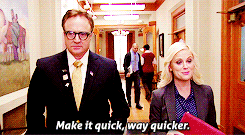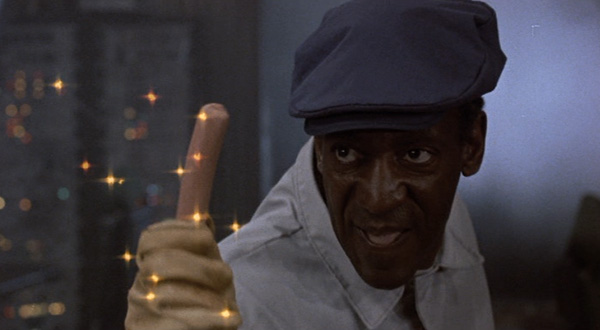This week the premiere date for the last season of
Parks and Recreation was
announced for January thirteenth. For the following 6 weeks two episodes of
Parks will air back to back on Tuesdays, squeezing the twelfth episode seventh and final chapter of the saga of Leslie Knope into just over a month. After all, why should NBC prolong the life of its only good remaining comedy series that isn't on in the middle of the night. Only a few years ago
Parks was only a small part of the network's then underperforming yet monumental and game changing block of comedies including
30 Rock and
The Office. The only other survivor is
Community, which will not air its sixth, and also likely final, season on TV at all. Instead the college comedy will continue on Yahoo! Screen.
In a way it's fitting that
Community and
Parks are the only remainders of that renaissance because both pay tribute to the great television of the past in their own ways.
Community wears its pop culture references on its sleeves with entire themed episodes that honor TV genres like the police procedural and the 80's cartoon, along with a myriad of movie genres.
Conversely,
Parks is much more subtle with its TV homages. So subtle that they're barely there at all and maybe I'm just overthinking this, but what do you want for nothing? The series with the most overt influence is
The West Wing (also on NBC)
. Actually,
Parks and Recreation may be the only political show worthy of being compared to Aaron Sorkin's presidential epic, just as Leslie Knope is one of the few television characters with as much inherent goodness and capacity to inspire as
The West Wing's hero Jed Bartlet.
Parks has been known to cast actors who have appeared on
The West Wing, the most notable being Rob Lowe, who starred as Sam Seaborn in the first four seasons of
West Wing and was introduced as Chris Traeger in the second season of
Parks. Unfortunately Lowe will only make a guest appearance in the final season as he's too busy taking commercial jobs where he thinks he's making fun of himself but he's actually just proposing tragic possible universes where he's anything other than spectacular. Lowe's
West Wing co-star Bradley Whitford also appeared in a season 4 episode of the
Parks. Other actors to appear in both shows include John Larroquette, J.K. Simmons, and Ron Swanson himself, Nick Offerman.
 |
Hurry! The opportunity for a Sorkin-walk-and-talk
reference is getting away! |
On the other hand, there aren't a lot of actors alive now who weren't on
The West Wing. What's more important is the similarities in character and their development. As previously mentioned, both shows' respective leads are goodhearted people who earn the respect and admiration of those around them with their moral fortitude. Of course, there couldn't be much of a show if the protagonists never had their beliefs challenged. As Leslie climbs the political ladder of Pawnee, Indiana she is forced to make compromises much like Jed did throughout his dual terms in the Oval Office. However, both characters use their savvy and integrity to make the most out of such difficult situations. For example, in their respective sixth seasons both Leslie and Jed make big decisions in foreign affairs. Leslie leads the charge for Pawnee to absorb its rival Eagleton when it goes bankrupt while Jed makes a monumental peace treaty with Israel and Palestine.
Of course,
Parks and Rec is a comedy, not a drama like
The West Wing, and as such it also draws from some of the great comedies of television past. Much of sitcom history can be found in Jerry Gergich, the local punching bag. Although Jerry is scorned by the other character on
Parks, the writers seem to love him and have given him an entirely pleasant home life comparable to the wholesome world of
Leave It to Beaver. Jerry's blissful circumstance includes a wife who, as has been mentioned several times on the show, is much more attractive than he is; a trope as old as the sitcom itself, dating back to
The Honeymooners.
Another standard sitcom relationship is the "opposites attract," most famously seen in Sam and Diane from
Cheers. The dynamic between Sam, a working class playboy, and Diane, a self righteous intellectual grows from mutual animosity to something resembling love. Similarly, when Ben Wyatt enters Pawnee as a budget specialist his callous approach to government immediately infuriates the passionate Leslie. Over time their relationship becomes the second most beautiful on the show, the first being April Ludgate and Andy Dwyer. April and Andy began the series not as foes but as friends, however, their differences are far more pronounced than that of Ben and Leslie, and perhaps even Sam and Diane. Andy is an endearing goofball with a heart of gold and April is an aloof nihilist. Their marriage is one few fans would have predicted in season one but most found to be a surprisingly perfect fit.
As sad as it is to see
Parks and Rec go, it isn't the end of the world. It isn't even the end of the network sitcom. No, that was in
1999 you silly goose. Sure, it would be great if NBC's "Must See TV" would come back along with ABC's "TGIF" and "my respect and admiration for Bill Cosby," but those things are gone.
Girl Meets World isn't getting any better and I'm a fool to get my hopes up for Shawn and Cory's reunion tonight. Instead we have
Brooklyn 99 and
Broad City and
BoJack Horseman and too many other great comedies to count. Besides, if history is any indication, NBC is only a few years away from another revival. If there's anything to be learned from this it's that NBC is the John Travolta of network prime time sitcom programming blocks. Hey, here's an idea,
Welcome Back Kotter reboot.








